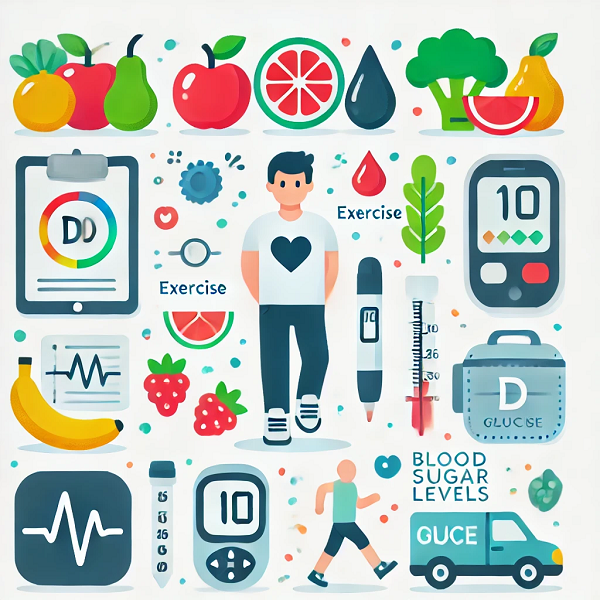Effective diabetes management is crucial for maintaining a good quality of life and preventing complications. With the right approach, you can lead a healthier, more active lifestyle. Here are some practical tips for managing diabetes.
Understanding Diabetes
Diabetes is a chronic condition that affects how your body turns food into energy. It occurs when the pancreas does not produce enough insulin or the body cannot effectively use it. There are two main types of diabetes: Type 1 and Type 2. Type 1 diabetes is usually diagnosed in children and young adults and occurs when the body does not produce insulin. Type 2 diabetes is more common and occurs when the body becomes resistant to insulin or when the pancreas stops producing enough insulin.
Importance of Lifestyle Management
Effective diabetes management involves a combination of medication, diet, exercise, and regular monitoring of blood sugar levels. Adopting a healthy lifestyle is crucial for keeping blood sugar levels within the target range and preventing complications such as heart disease, kidney damage, and nerve damage.
Healthy Eating
1. Balanced Diet: Eating a balanced diet is essential for managing diabetes. Focus on incorporating various foods from all food groups: fruits, vegetables, whole grains, lean proteins, and healthy fats. Avoid foods high in sugar, refined carbohydrates, and unhealthy fats.
2. Carbohydrate Counting: Carbohydrates have the most significant impact on blood sugar levels. Learning to count carbohydrates can help you manage your blood sugar more effectively. Work with a registered dietitian to determine the right amount of carbohydrates for your individual needs.
3. Portion Control: Eating large portions can lead to spikes in blood sugar levels. Use smaller plates, measure portions, and be mindful of serving sizes to help control your intake.
4. Meal Timing: Eating at regular intervals helps maintain stable blood sugar levels. Try to eat your meals and snacks at the same time each day.
5. Healthy Snacking: Choose snacks that are low in sugar and high in fiber, such as nuts, seeds, and fresh vegetables. Avoid sugary snacks and beverages.
Physical Activity
1. Regular Exercise: Physical activity helps your body use insulin more efficiently, lowers blood sugar levels, and improves overall health. Aim for at least 150 minutes of moderate-intensity aerobic activity each week, such as brisk walking, cycling, or swimming.
2. Strength Training: Incorporate strength training exercises into your routine at least twice a week. Building muscle mass helps increase insulin sensitivity and can help with blood sugar control.
3. Stay Active Throughout the Day: In addition to scheduled exercise, try to stay active throughout the day. Take short breaks to walk around, stretch, or do light exercises.
Blood Sugar Monitoring
1. Regular Monitoring: Monitor your blood sugar levels regularly as directed by your healthcare provider. Tracking your levels helps you understand how different foods, activities, and medications affect your blood sugar.
2. Use Technology: Consider using continuous glucose monitors (CGMs) or other diabetes management apps to track your blood sugar levels and receive real-time feedback.
Medication Management
1. Follow Your Prescription: Take your medications as your healthcare provider prescribes. Do not skip doses or make changes without consulting your doctor.
2. Understand Your Medications: Learn about your medications, including how they work, possible side effects, and how to manage them.
Stress Management
1. Practice Relaxation Techniques: Stress can affect blood sugar levels. To manage stress, practice relaxation techniques such as deep breathing, meditation, or yoga.
2. Get Enough Sleep: Aim for 7-9 hours of sleep each night. Poor sleep can affect blood sugar control and increase stress levels.
Regular Check-Ups
1. Regular Health Check-Ups: Visit your healthcare provider regularly for check-ups and screenings. Regular visits help catch any potential issues early and allow for timely adjustments to your management plan.
2. Eye and Foot Care: Diabetes can affect your eyes and feet. Have regular eye exams and foot check-ups to detect any problems early.
Building a Support System
1. Support Groups: Join a diabetes support group to connect with others who understand what you are going through. Sharing experiences and tips can be very helpful.
2. Educate Family and Friends: Educate your family and friends about diabetes to support your management efforts.
Further Reading and Research
For more detailed information and research on managing diabetes, consider exploring the following resources:
- American Diabetes Association (ADA):
- Website: diabetes.org
- Offers comprehensive information on diabetes management, research, and support.
- National Institute of Diabetes and Digestive and Kidney Diseases (NIDDK):
- Website: niddk.nih.gov
- Provides research-based information on diabetes and related conditions.
- Centers for Disease Control and Prevention (CDC):
- Website: cdc.gov/diabetes
- Offers guidelines and tips for managing diabetes.
- Mayo Clinic:
- Website: mayoclinic.org
- Provides expert advice and information on diabetes care.
- Harvard Health Publishing:
- Website: health.harvard.edu
- Features articles and research on various aspects of diabetes management.
- Previous Blog Articles:
By incorporating these tips into your daily routine and staying informed through reputable sources, you can effectively manage your diabetes and lead a healthier, more fulfilling life. Remember, managing diabetes is a continuous journey; with the right support and resources, you can achieve your health goals.







Pingback: How to Raise Children Who Have Type 1 Diabetes and the Challenges Parents Face